Features
Bassist Carter Lee – Why Is Music Important (The Panel Experiment) by Brent-Anthony Johnson
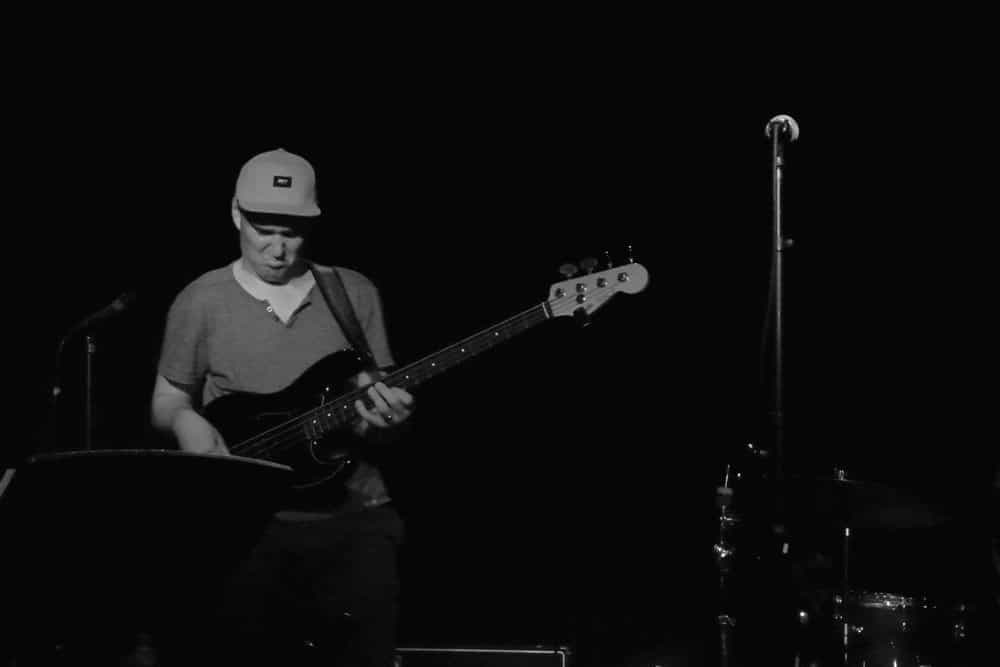
Bassist Carter Lee – Why Is Music Important (The Panel Experiment) by Brent-Anthony Johnson…
Who are you, and what do you do?
My name is Carter Lee and I am a musician. Specifically I play bass, produce music and I am currently developing an outreach program in Los Angeles to teach under-served youth. You can find me online at www.carterleemusic.com
Who are your primary musical influences, and at what age did you begin pursuing music as a vocation?
My influences seem to change every couple of years! But, hearing Jaco’s first record really swayed me into a life-long musical pursuit… I was 19 at the time. I am currently really into Thundercat, Pino Palladino, Tim Lefebvre, Derrick Hodge, Chet Faker and James Blake
Can you tell us about your earliest musical listening and performance experiences? Also, what projects are you participating in most recently?
I remember the first concert I saw was Harry Connick Jr. I think I was 8-years-old and I’m fairly sure I fell asleep! I actually really dig him now… but, at the time, I was probably just out past my bedtime. I didn’t really perform at all until I got to college, and then I did all the time. I started studying music at a small school and was one of only a handful of bass players – which put me into a ton of playing situations, most of which I wasn’t ready for! This was, by far, the most progression I had in my education. Having just moved to LA, I’m still sorting out the playing side of things. Back on the East Coast I was working with Shea Rose, Moruf, Rhys Tivey and Joe Marson to name a few.
What are you listening to musically, in the past 12 months that has enhanced the way you think about music and your craft?
The past year has been incredible for records that place the onus on musicians’ performances! In particular, Kendrick Lamar’s “To Pimp a Butterfly”, and David Bowies “Blackstar”, are two records that really allow the musicians to shine! It’s been really exciting to listen to and to feel that artists and producers are really coming back to experimenting, and allowing performers do what they do best!

How would you describe your perfect tone for the instruments your regularly record and perform on? Also, are there any particular gear choices you’ve made along the way that has enhanced your tone for the better?
My perfect tone would be mellow, dark, warm and of course first and foremost, supportive. I was extremely lucky in that the first bass I owned was a vintage Fender Jazz Bass that my father had purchased years before I was born. I haven’t found anything that comes close to the way it plays and sounds. There’s just something about the way the wood dries out over time that gives the bass some clarity that new instruments don’t have. As far as gear choices… a couple years ago I started using flat wound strings (D’Addario Chromes to be exact) on the J. They fit more of the situations I find myself in, musically – especially when I’m supporting a vocalist! There is only a subtle difference. But, there’s more soul in those flat wounds than any other string I’ve used!
If we wanted to listen to you, which recordings would you suggest? Along with that, which recordings are your proudest of, and why?
I’m very proud of the Tiger Speak material that’s out there. I wrote the majority of the songs for those records. I’m also very excited about upcoming releases by Rhys Tivey and Moruf that I played on. Rhys’ record will be out shortly, and I can say that it is some of the most challenging and exciting music I have ever played.

Are you involved in educating others? What is your teaching philosophy? Also, if you could change one thing about the way music students learn, what would that be?
I have always loved teaching and I am very fortunate to be on the development side of the Loud Program here in LA. In addition to teaching privately, I also developed a course on band leading that you can find at soundfly.com. My ideal as a teacher centers around putting the students on a path toward finding their own voice. It’s easy to teach by the book, and, of course, there are a lot of fundamental elements that every student needs. But if you can get a student to realize that the goal is individualism (and a sound you can call your own) they will never tire of trying to find those qualities. I would change post-secondary schools’ approach to music education. I’ve gone to small schools, and big schools, and there seems to be something very impersonal about a music education at large institutions.
How does your personal musical voice directly relate to the function of the basses? Also, what are your main instruments?
I love being able to change the harmony or rhythmic content of a tune on the fly, and the bass allows me to do that!
The ‘63 Fender is my main bass, and I also love my Micro-Korg for synth work. I also have a 1990 Fender J 62’ reissue that sees some time.
Describe your musical composition process.
It usually starts with a melody that I sing into my phone, that I will, later, sit at the piano and build around. Other times, I will start by building a groove in LOGIC and then add harmonies. I’ve been writing with just the bass more frequently, as well. Wherever I am when an idea hits me will most often dictate how I start to piece it together.
How does music affect your culture and immediate environment?
The majority of my friends are musicians, my wife is a musician, and my entire life is surrounded by music. I find that since I am so involved in music I need to try to find things that can take me out of it in order to balance my life.
What would you be, if not a professional musician?
I’d probably be involved in golf in some way.
What is the greatest sacrifice you’ve ever made while in the practice of being a musician, and how did that sacrifice affect you?
Moving away from my family and friends. I am, originally, from Canada and miss it for sure. Being in California has allowed me to meet and work with some incredible musicians.

Describe your standing practice regimen. Also, what technical (and musical) aspects of your playing are you currently working on?
This changes a lot, depending on the time I have… But, I try to read a lot! I read the Bach cello suites or James Jamerson transcriptions, and I definitely transcribe as a regular practice element. Then, of course, there is the practice of playing along to records! I’m always just trying to refine my sound and trying to develop my own identity in that respect.
What does music, and being a musician, mean to you – at the deepest level of your being?
It means everything to me! It’s given me almost everything I have in my life over the past ten plus years.
How important is it to understand the Language of music?
If you want to be a musician, reading is huge! It goes so much deeper than just being able to read music… A musician needs to have a wealth of knowledge of albums, grooves, and musical textures that you can access at any time. I think that anyone trying to better understand the language of music should try to produce more. That will get you thinking about music in a way you never thought you could and as bass players it will allow you play in a way that serves the song.
How do you collect the series of seemingly random influences and articulate them through music?
I don’t actively think about what is influencing me. I know I’m aware of what I want to put into my music, but I try to let it happen as naturally as possible.
Can music ever truly become commercial? Why, or why not?
I think we’re always going to have musicians who make music primarily for commercial gain, and those who make music only because they want to share their art. Then, there are those who are fortunate enough to be some form of both musician types. The Internet really fractured the ability of some musicians to make money, while it also gave a huge platform for those that just want to create and present their music to the world. I’m holding out hope that we will find more stability for selling music in the future. As always, no matter what the landscape is, there will be room for those musicians making great music.
Features
Alberto Rigoni On Unexpected Lullabies
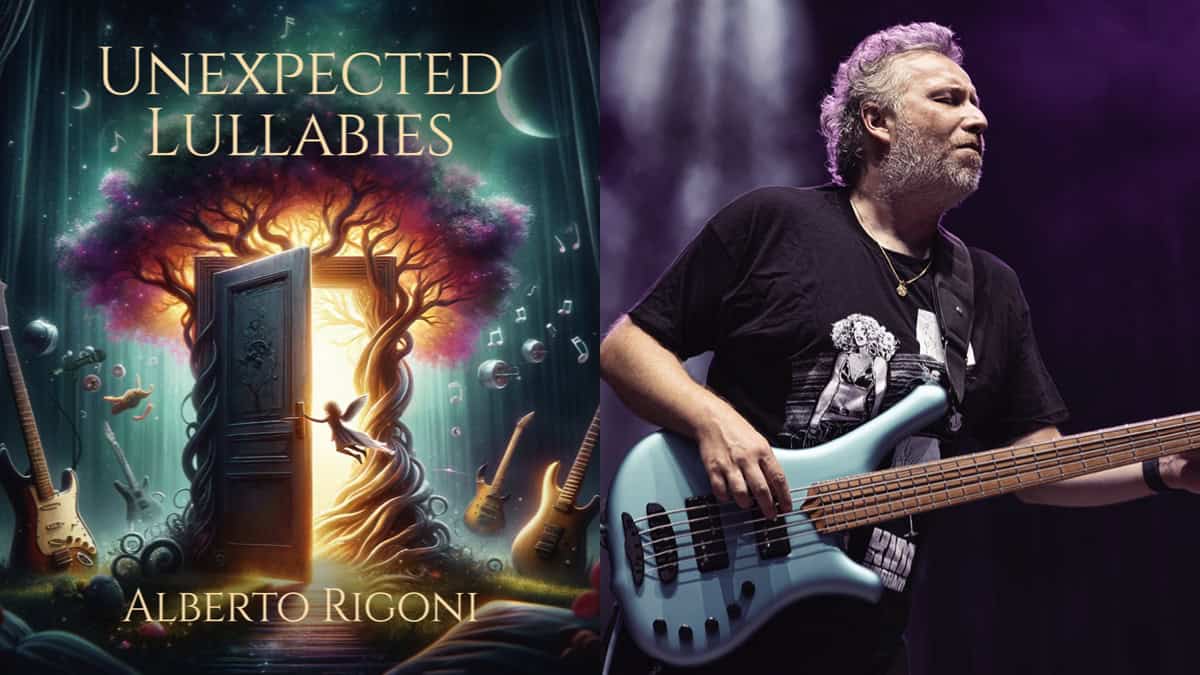
Readers have been fans of the composer, bass player, and Bass Musician contributor Alberto Rigoni for some time now.
In this interview, we had the opportunity to hear directly from Alberto about his love of music and a project near and dear to his heart, “Unexpected Lullabies”…
Could you tell our readers what makes your band different from other artists?
In 2005, I felt the urge to write original music. My first track was “Trying to Forget,” an instrumental piece with multiple bass layers (rhythm, solo, and arrangement), similar to the Twin Peaks soundtrack. When I played it for a few people, they really liked it, and I decided to continue composing based on my instinct and ear without adhering to any specific genre. In 2007, I released “Something Different” with Lion Music. The title says it all! Since then, I’ve released many solo albums, each different from the others, ranging from ambient to prog, fusion, jazz, and new age. I am very eclectic!
How did you get involved in this crazy world of music?
As a child, I listened to the music my parents enjoyed: my dad loved classical music, while my mom was into Pink Floyd, Genesis, Duran Duran, etc. These influences left a significant mark on my life. However, the turning point came at 15 when a drummer friend played me “A Change of Seasons” by Dream Theater, which was a shock! From that moment, I decided to play bass and cover Dream Theater songs, which I did for many years with my cover band, Ascra, until it disbanded in 2004. After that, I joined TwinSpirits (prog rock) led by multi-instrumentalist Daniele Liverani. Since then, I haven’t played any more covers!
Who are your musical inspirations, and what inspired the album and the songs?
My roots are in progressive rock metal, with influences from bands like Dream Theater, Symphony X, and many others. However, I listen to all genres and try to keep an open mind, which helps me compose original music. On bass, I was significantly inspired by Michael Manring and Randy Coven (bassist of Ark, Steve Vai, etc.). But I don’t have a real idol; I just follow my own path without compromise.
What are your interests outside of music?
Living in Italy, I love good food and wine! Beyond that, I have a deep interest in art in general and history, not just of my country. I enjoy spending time with friends, skiing, biking, and walking in nature. This is how I spend my free time. The rest of my time is devoted to music and my family!
Tell us about the new album.
It is definitely an out-of-the-box album. When I found out last year that I was going to have a baby girl, I decided to compose a sort of lullaby album, but I didn’t want to cover already famous lullabies. So, I started composing new tunes with the goal of creating an album that was half-sweet and half-hard rock. I did include some covers like “Strangers in the Night” by Frank Sinatra, sung by Goran Edman, former lead singer of Malmsteen. It’s not exactly a lullaby, but I felt the lyrics fit the album, as does the instrumental version of “Fly Me to The Moon.” There are also tracks with just bass and piano (Nenia) or two basses (Vicky). It was definitely an interesting creative process!
What is the difference between the new album and your previous releases, and will there be any new material from your other outfit called BAD AS?
BAD AS is essentially a metal band with several influences including prog. My solo genre is quite different, although there are some metal songs on a few albums. It’s always difficult for me to categorize my music… let’s say it’s a mix of prog, ambient, fusion, and new age.
Where was the album recorded, who produced it, and how long did the process take?
I produced my last album entirely by myself, including mixing and mastering. Unlike other albums I’ve produced within a few months, this one took much longer, perhaps because I was very busy or maybe because I wanted it to be perfect for my daughter, who is now three months old. In any case, I am satisfied. Once again, I did something different from my previous albums.
What is the highlight of the album for you and why?
My favorite song is the first track titled “Vittoria,” named after my daughter. It’s the intro to the record and isn’t very long, but the melody stuck in my head. Another standout track is the instrumental version of “Fly Me to The Moon” by Frank Sinatra, where I used fretless bass. The first part is sweet, the second part definitely rocks!
How are the live shows going, and what are you and the band hoping to achieve?
With BAD AS, this year we shared the stage with David Ellefson’s (former Megadeth bassist) band and talented young singer Dino Jelusik (White Snake). We plan to continue performing all over Europe!
What’s in store for the future?
I am working on an instrumental project called Nemesis Call, a progressive shred prog metal album with various influences. It will feature guest appearances from famous musicians like drummers Mike Terrana and Thomas Lang, as well as young talents like Japanese guitarist Keiji from Zero (19), 14-year-old Indian drummer Sajan Young, and guitarists Alexandra Zerner and Alexandra Lioness, Hellena Pandora. It’s scheduled for release at the end of the year or early 2025. As an independent artist, I have launched a fundraising campaign with exclusive pledges at www.albertorigoni.net/nemesiscall. And no, I am not begging; the album will be released anyway!
What formats is the release available in?
Unexpected Lullabies is available both as a Digipack CD and on streaming platforms.
What is the official album release date?
June 4th, 2024.
Thanks for this interview Bass Musician Magazine and for the continued support to my career!
Visit Online:
www.albertorigoni.net
www.youtube.com/albertorigoni
albertorigoni.bandcamp.com
www.instagram.com/albertorigonibassplayer
www.facebook.com/albertorigonimusic
www.tiktok.com/@albertorigonibassist
CD Track Listing:
1. Vittoria
2. Fly Me to the Moon
3. Azzurra
4. Dancing with Tears in My Eyes (feat. John Jeff Touch)
5. Out of Fear
6. Veni Laeatitia (feat. Alexandra Zerner)
7. Nenia
8. Slap Lullaby (feat. Karl Clews)
9. Saga
10. Vicky (feat. Michael Manring)
11. Ocean Travelers (feat. Vitalij Kuprij)
12. Strangers in the Night (feat. Göran Edman)
13. Peaceful
14. Un uomo che voga (feat. Eleonora Damiano)
Band Line-Up:
- Tommaso Ermolli arrangements on “Vittoria”
- Sefi Carmel on “Fly Me to the Moon” (Cover) (except for the keyboard solo by Alessandro Bertoni)
- Piano and keyboards by Alessandro Bertoni on “Azzurra”
- Leonardo Caverzan, guitars, and John Jeff Touch, vocals on “Dancing with Tears in my Eyes” (Cover)
- T. Ermolli keys on “Out of Fear”
- Alexandra Zerner everything on “Veni Laetitia”
- Daniele Bof piano on “Nenia”
- Karl Clews, piccolo bass on “Slap Lullaby”
- Jonas Erixon vocals and guitars on “Saga”
- Michael Manring bass on “Vicky”
- Vitalij Kuprij, keyboards and piano, and Josh Sapna, guitars, on “Ocean Traveler”
- Göran Edman, vocals, Emiliano Tessitore, guitars, Emiliano Bonini, drums, on “Strangers in the Night” (Cover) everything by Alberto Rigoni and vocals by Federica “Faith”
- Sciamanna on “Peaceful”
- T. Ermolli, guitars, and Eleonora Damiano, vocals, on “Un uomo che voga All drums programmed by Alberto Rigoni
Bass Books
Interview With Barker Bass’s Inventor and Writer Lee Barker
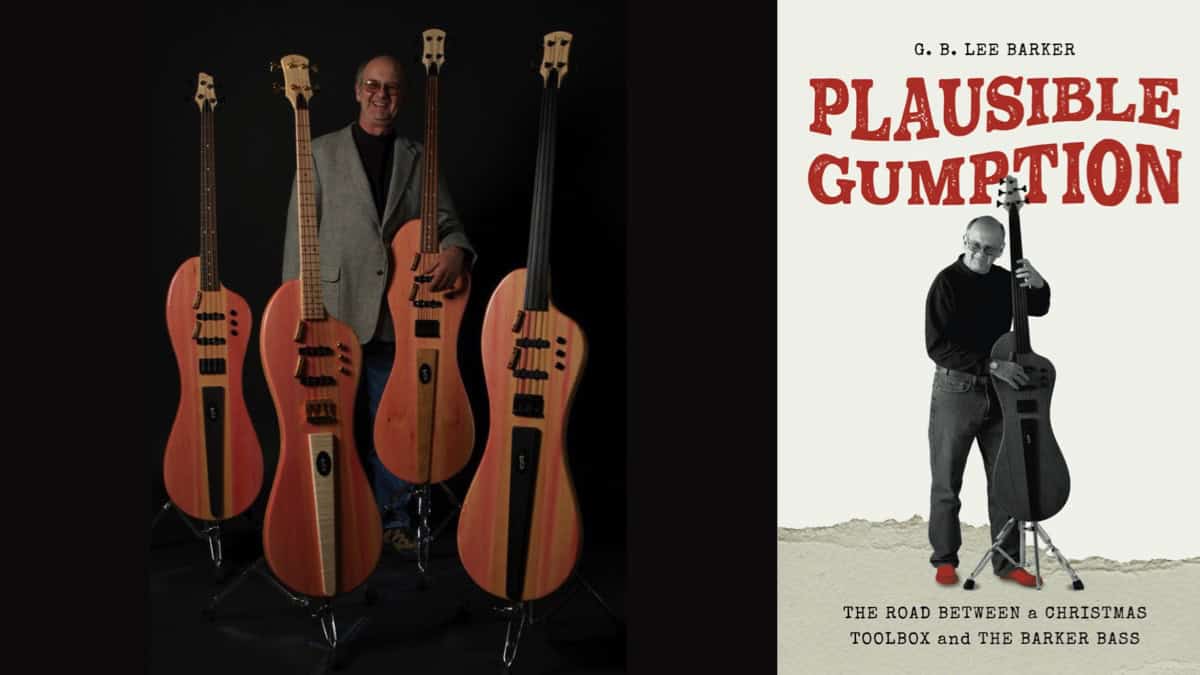
If you are an electric bass player, this is an exciting time to be alive as this relatively new instrument evolves around us. Some creative individuals have taken an active role in this evolution and made giant leaps in their own direction. Lee Barker is one of these inventive people having created the Barker Bass.
Fortunately, Lee is also an excellent writer (among so many talents) and has recently released his book “Plausible Gumption, The Road Between a Christmas Toolbox and The Barker Bass”. This book is a very fun read for everyone and shares a ton of details about Lee’s life in general, his experiences as a musician, a radio host, and a luthier. Now I am fortunate to have the great opportunity to gain even more insights into this renaissance man with this video interview.
Plausible Gumption, The Road Between a Christmas Toolbox and The Barker Bass is available online at Amazon.com
Features
Bergantino Welcomes Michael Byrnes to Their Family of Artists
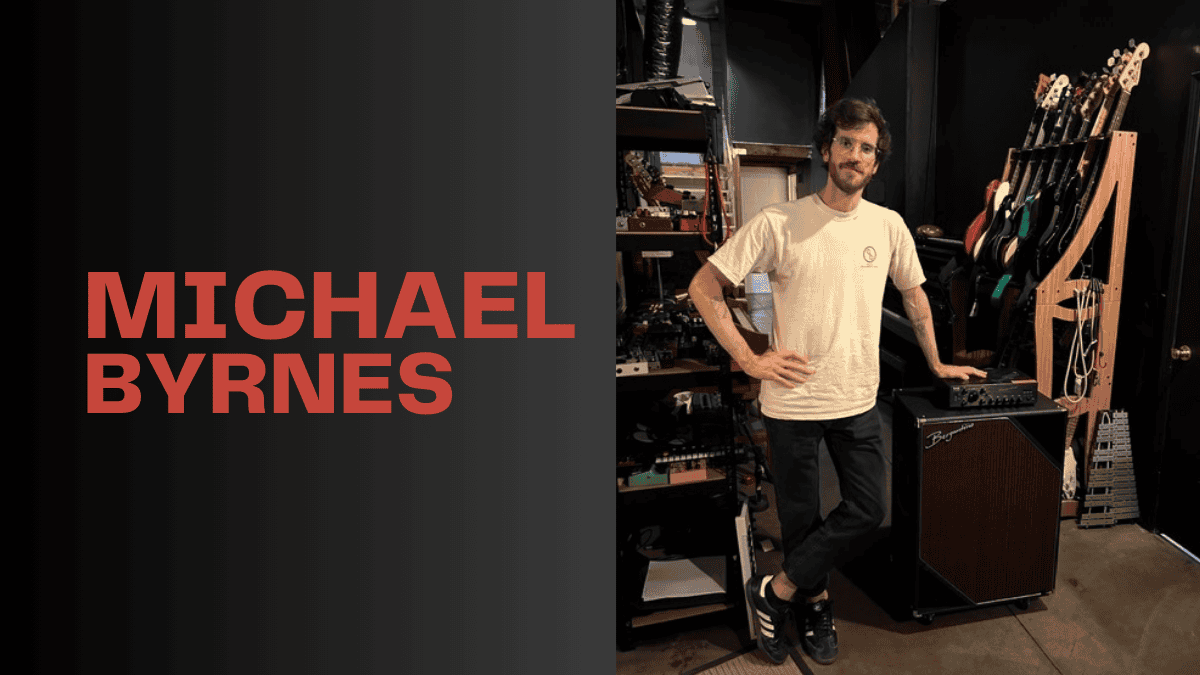
Interview and photo courtesy of Holly Bergantino of Bergantino Audio Systems
With an expansive live show and touring, Mt. Joy bassist Michael Byrnes shares his experiences with the joyful, high-energy band!
Michael Byrnes has kept quite a busy touring schedule for the past few years with his band, Mt. Joy. With a philosophy of trial and error, he’s developed quite the routines for touring, learning musical instruments, and finding the right sound. While on the road, we were fortunate to have him share his thoughts on his music, history, and path as a musician/composer.
Let’s start from the very beginning, like all good stories. What first drew
you to music as well as the bass?
My parents required my sister and I to play an instrument. I started on piano and really didn’t like it so when I wanted to quit my parents made me switch to another instrument and I chose drums. Then as I got older and started forming bands there were never any bass players. When I turned 17 I bought a bass and started getting lessons. I think with drums I loved music and I loved the idea of playing music but when I started playing bass I really got lost in it. I was completely hooked.
Can you tell us where you learned about music, singing, and composing?
A bit from teachers and school but honestly I learned the most from just going out and trying it. I still feel like most of the time I don’t know what I am doing but I do know that if I try things I will learn.
What other instruments do you play?
A bit of drums but that’s it. For composing I play a lot of things but I fake it till I make and what I can’t fake I will ask a friend!
I know you are also a composer for film and video. Can you share more
about this with us?
Pretty new to it at the moment. It is weirdly similar to the role of a bass player in the band. You are using music to emphasize and lift up the storyline. Which I feel I do with the bass in a band setting. Kind of putting my efforts into lifting the song and the other musicians on it.
Everybody loves talking about gear. How do you achieve your “fat” sound?
I just tinker till it’s fat lol. Right now solid-state amps have been helping me get there a little quicker than tube amps. That’s why I have been using the Bergantino Forté HP2 – Otherwise I have to say the cliche because it is true…. It’s in the hands.
Describe your playing style(s), tone, strengths and/or areas that you’d like
to explore on the bass.
I like to think of myself as a pretty catchy bass player. I need to ask my bandmates to confirm! But I think when improvising and writing bass parts I always am trying to sneak little earworms into the music. I want to explore 5-string more!
Who are your influences?
I can’t not mention James Jamerson. Where would any of us be if it wasn’t for him? A lesser-known bassist who had a huge effect on me is Ben Kenney. He is the second bassist in the band Incubus and his playing on the Crow Left the Murder album completely opened me up to the type of bass playing I aspire towards. When I first started playing I was really just listening to a lot of virtuosic bassists. I was loving that but I couldn’t see myself realistically playing like that. It wasn’t from a place of self-doubt I just deep down knew that wasn’t me. Ben has no problem shredding but I was struck by how much he would influence the song through smaller movements and reharmonizing underneath the band. His playing isn’t really in your face but from within the music, he could move mountains. That’s how I want to play.
What was the first bass you had? Do you still have it?
A MIM Fender Jazz and I do still have it. It’s in my studio as we speak. I rarely use it these days but I would never get rid of it.
(Every bass player’s favorite part of an interview and a read!) Tell us about
your favorite bass or basses. 🙂
I guess I would need to say that MIM Jazz bass even though I don’t play it much. I feel connected to that one. Otherwise, I have been playing lots of great amazing basses through the years. I have a Serek that I always have with me on the road (shout out Jake). Also have a 70’s Mustang that 8 times out of 10 times is what I use on recordings. Otherwise, I am always switching it up. I find that after a while the road I just cycle basses in and out. Even if I cycle out a P bass for another P bass.
What led you to Bergantino Audio Systems?
My friend and former roommate Edison is a monster bassist and he would gig with a cab of yours all the time years ago. Then when I was shopping for a solid state amp the Bergantino Forté HP2 kept popping up. Then I saw Justin Meldal Johnsen using it on tour with St. Vincent and I thought alright I’ll give it a try!
Can you share a little bit with us about your experience with the Bergantino
forte HP amplifier? I know you had this out on tour in 2023 and I am pretty
certain the forte HP has been to more countries than I have.
It has been great! I had been touring with a 70’s SVT which was great but from room to room, it was a little inconsistent. I really was picky with the type of power that we had on stage. After a while, I thought maybe it is time to just retire this to the studio. So I got that Forte because I had heard that it isn’t too far of a leap from a tube amp tone-wise. Plus I knew our crew would be much happier loading a small solid state amp over against the 60 lbs of SVT. It has sounded great and has really remained pretty much the same from night to night. Sometimes I catch myself hitting the bright switch depending on the room and occasionally I will use the drive on it.
You have recently added the new Berg NXT410-C speaker cabinet to your
arsenal. Thoughts so far?
It has sounded great in the studio. I haven’t gotten a chance to take it on the road with us but I am excited to put it through the paces!
You have been touring like a madman all over the world for the past few
years. Any touring advice for other musicians/bass players? And can I go to Dublin, Ireland with you all??
Exercise! That’s probably the number one thing I can say. Exercise is what keeps me sane on the road and helps me regulate the ups and downs of it. Please come to Dublin! I can put you on the guest list!
It’s a cool story on how the Mt. Joy band has grown so quickly! Tell us
more about Mt. Joy, how it started, where the name comes from, who the
members are and a little bit about this great group?
Our singer and guitarist knew each other in high school and have made music together off and on since. Once they both found themselves living in LA they decided to record a couple songs and put out a Craigslist ad looking for a bassist. At the time I had just moved to LA and was looking for anyone to play with. We linked up and we recorded what would become the first Mt. Joy songs in my house with my friend Caleb producing. Caleb has since produced our third album and is working on our fourth with us now. Once those songs came out we needed to form a full band to be able to do live shows. I knew our drummer from gigging around LA and a mutual friend of all of us recommended Jackie. From then on we’ve been on the road and in the studio. Even through Covid.
Describe the music style of Mt. Joy for me.
Folk Rock with Jam influences
What are your favorite songs to perform?
Always changing but right now it is ‘Let Loose’
What else do you love to do besides bass?
Exercise!
I always throw in a question about food. What is your favorite food?
I love a good chocolate croissant.
Follow Michael Byrnes:
Instagram: @mikeyblaster
Follow Mt. Joy Band:
Instagram: https://www.instagram.com/mtjoyband
Facebook: https://www.facebook.com/mtjoyband
Bass Videos
Artist Update With Mark Egan, Cross Currents
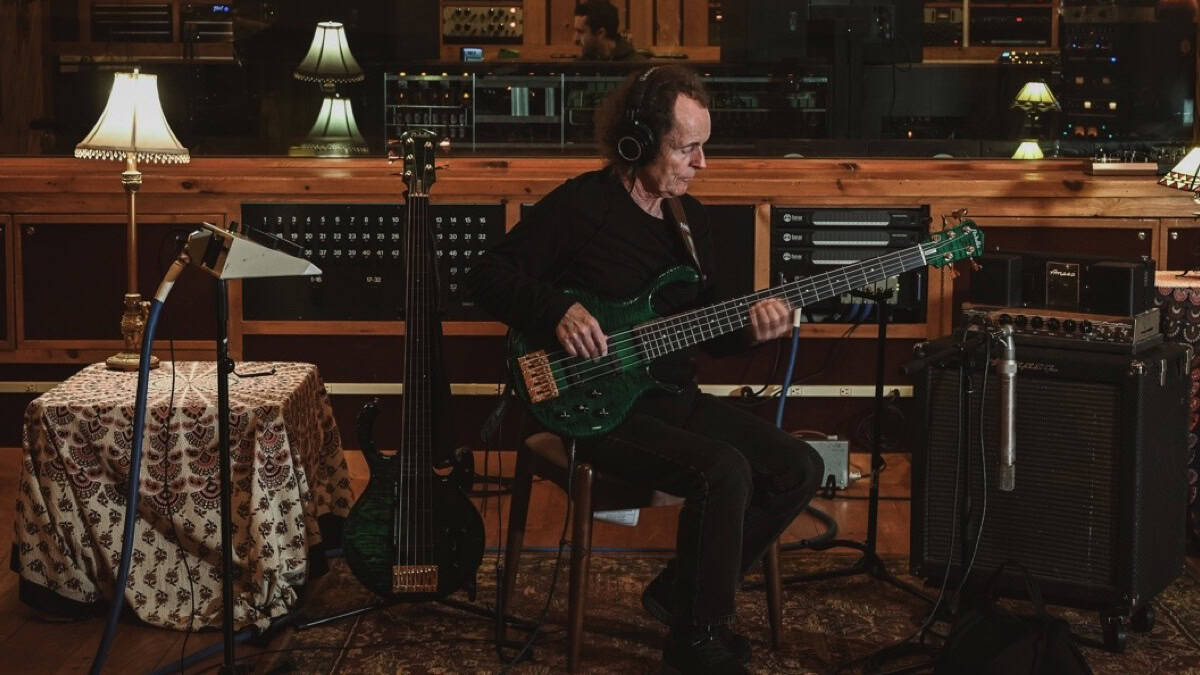
I am sure many of you are very familiar with Mark Egan as we have been following him and his music for many years now. The last time we chatted was in 2020.
Mark teamed up with drummer Shawn Pelton and guitarist Shane Theriot to produce a new album, “Cross Currents” released on March 8th, 2024. I have been listening to this album in its entirety and it is simply superb (See my review).
Now, I am excited to hear about this project from Mark himself and share this conversation with our bass community in Bass Musician Magazine.
Photo courtesy of Mark Egan
Visit Online:
markegan.com
markegan.bandcamp.com
Apple Music
Amazon Music
Bass Videos
Interview With By the Thousands Bassist Adam Sullivan
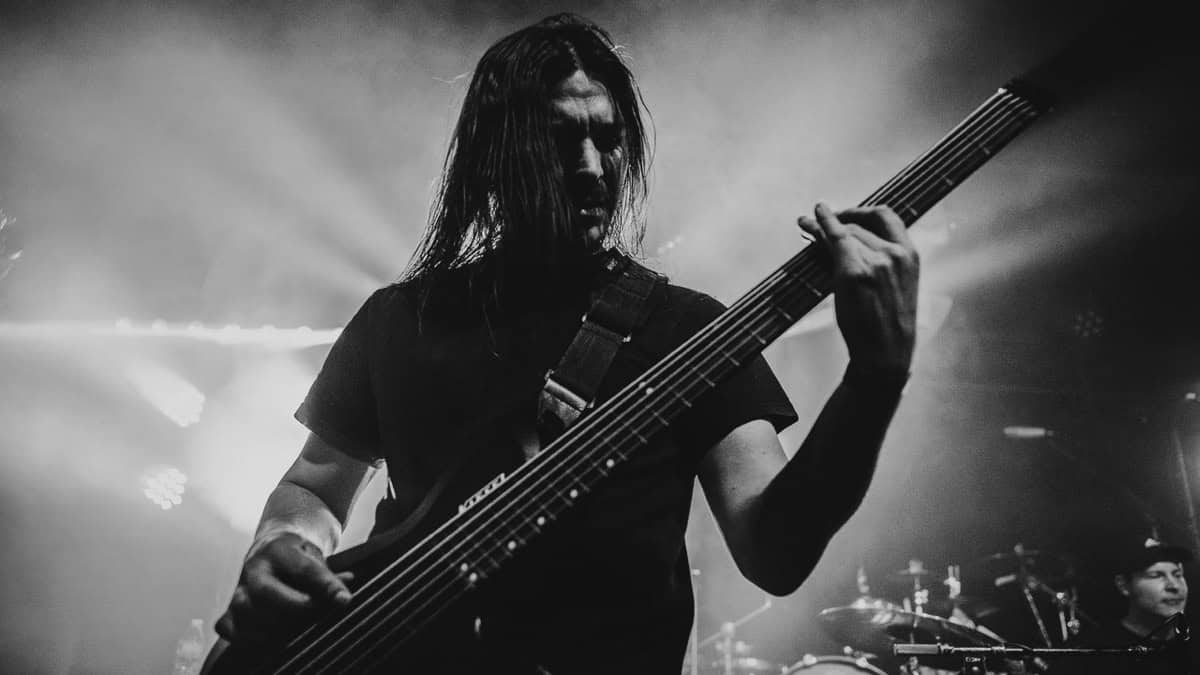
Bassist Adam Sullivan…
Hailing from Minnesota since 2012, By the Thousands has produced some serious Technical Metal/Deathcore music. Following their recent EP “The Decent”s release, I have the great opportunity to chat with bassist Adam Sullivan.
Join me as we hear about Adam’s musical Journey, his Influences, how he gets his sound, and the band’s plans for the future
Photo, Laura Baker
Featured Videos:
Follow On Social
IG &FB @bythethousands
YTB @BytheThousands











